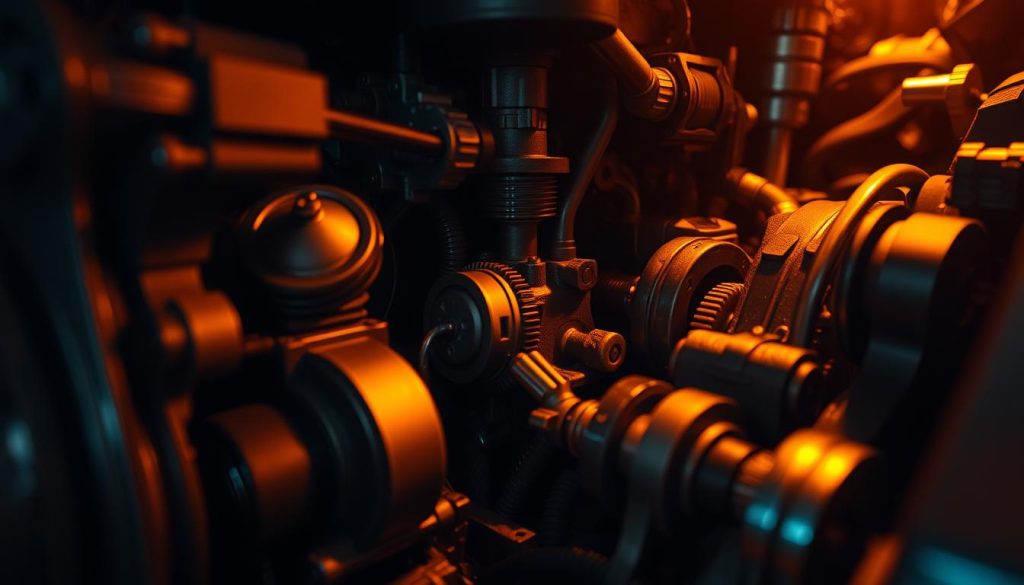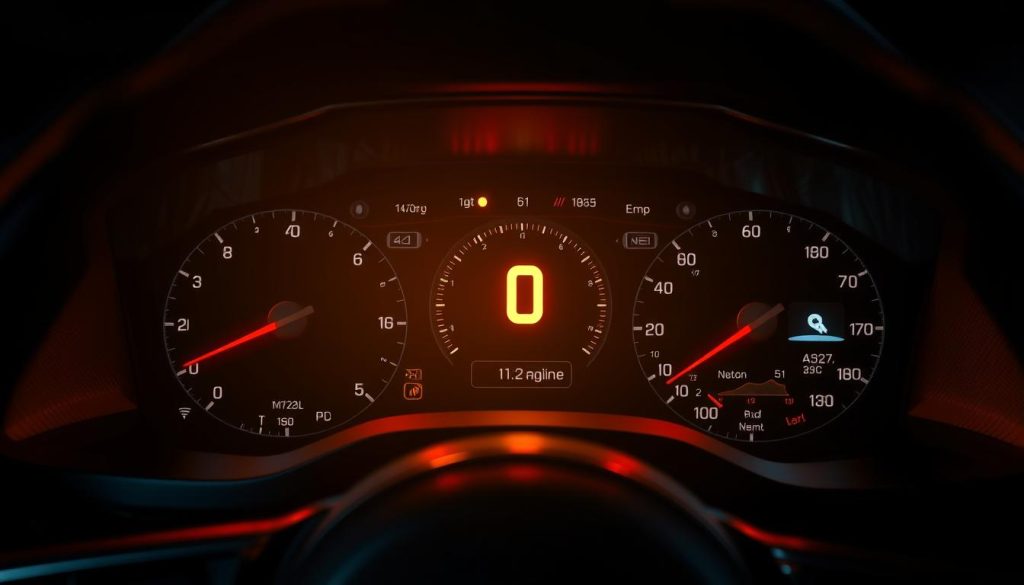Your car’s engine works like its heartbeat. When odd sounds or performance changes appear, it’s easy to feel overwhelmed. At Heaven Automotive, we’ve seen how catching small issues early can prevent big headaches later. Let’s break down what those unusual knocks or whines might mean—and how to respond.
Modern vehicles are smarter than ever. Dashboard lights or irregular noises often signal your auto’s internal systems need a checkup. Whether it’s a rattling noise at startup or sluggish acceleration, these clues matter. Ignoring them could lead to expensive problems, but acting fast keeps repairs manageable.
We’ll walk you through the most common red flags drivers notice. From sudden stalling to mysterious smoke, understanding these signs helps you decide: Is this a quick fix or a trip to the shop? Diagnostic tools in newer models provide hints, but human expertise still plays a key role.
Key Takeaways
- Early detection of engine issues can save thousands in repair costs.
- Unusual noises or dashboard alerts are your vehicle’s way of asking for help.
- Modern diagnostic systems provide clues, but professional analysis is critical.
- Learn when to drive safely to a mechanic versus calling for a tow.
- Minor maintenance differs vastly from urgent engine repairs—know the difference.
- Trusted guidance helps you make confident decisions about your auto’s health.
- Heaven Automotive specializes in pinpointing and resolving engine concerns efficiently.
Understanding the Warning Signs of Engine Trouble
Modern vehicles whisper clues about their health long before serious problems develop. At Heaven Automotive, we’ve found most drivers miss these subtle hints because they’re unfamiliar with their car’s “language.” Let’s decode what your vehicle might be telling you.
What Every Driver Should Know
Your engine uses sensors like a nervous system. When one malfunctions, it can cause chain reactions. A shaky idle or hesitation during acceleration often starts small. We’ve fixed countless cars where early action saved owners from rebuild costs.
Early Indicators to Watch For
Three patterns demand attention:
- Repeated difficulty starting the vehicle
- Unusual vibrations felt through the steering wheel
- Sudden drops in fuel efficiency
These issues rarely fix themselves. Our diagnostic tools map sensor data to pinpoint weak spots. Catching a failing oxygen sensor or clogged fuel injector early keeps repair bills manageable. Remember – your car speaks through changes, not words.
Identifying Unusual Engine Noises
That rumble under your hood isn’t just background noise—it’s a coded message. Our team at Heaven Automotive deciphers these sounds daily, separating harmless quirks from urgent mechanical cries for help. Let’s explore what your car might be saying.

Knocking, Popping, and Hissing Explained
A rhythmic knocking often points to worn bearings or low oil pressure. Think of it as your engine’s way of begging for lubrication. Sharp popping noises? Those usually trace to ignition issues—faulty spark plugs or misbehaving coils disrupting combustion.
Hissing demands immediate attention. It often means coolant or vacuum leaks, which can escalate to overheating within miles. We’ve towed cars where drivers ignored this sound, only to face cracked engine blocks.
When Grinding Demands Action
Metal-on-metal grinding usually originates from brakes, not the engine. But if it happens while accelerating, suspect transmission trouble. Either way, continuing to drive risks turning a $200 fix into a $2,000 overhaul.
Our technicians recommend:
- Shutting off the vehicle immediately for knocking/hissing
- Safely driving to the shop for isolated grinding during braking
- Recording the sound on your phone for clearer diagnosis
Last week, a customer described a “popcorn machine under the dash.” We pinpointed a loose heat shield in minutes. Whether it’s subtle clicks or alarming clangs, we translate engine sounds into solutions.
Spotting Engine Performance Issues Early
Drivers often notice changes in their car’s behavior before major issues arise. At Heaven Automotive, we specialize in translating these subtle shifts into actionable insights. Let’s explore how to catch declining engine performance before it leaves you stranded.
Loss of Power and Poor Fuel Efficiency
Does your vehicle struggle uphill or hesitate when merging? This power loss often stems from clogged exhaust systems or weak fuel pumps. We’ve seen cases where replacing worn spark plugs restored 15% horsepower overnight.
Frequent gas station stops? Poor fuel efficiency frequently links to:
- Blocked fuel injectors
- Faulty oxygen sensors
- Dirty air filters
One customer saved $78/month after we fixed their sensor sending false data to the engine computer.
Engine Stalling and Its Implications
Stalling at red lights isn’t normal. It often signals fuel delivery problems or failing sensors. Last month, we diagnosed a vehicle that stalled randomly—traced to a dying fuel pump relay.
Ignoring stalling risks catalytic converter damage. Restricted exhaust flow can slash engine performance by 40%. Our team uses live data monitoring to spot these issues before components fail completely.
Pro tip: Track your mileage. A sudden 3 MPG drop often precedes visible symptoms. Let us help decode your car’s whispers into clear maintenance steps.
Check Engine Light: Your Immediate Diagnostic Tool
That glowing dashboard icon isn’t just decoration—it’s your car’s SOS signal. At Heaven Automotive, we’ve decoded thousands of these alerts using our advanced diagnostic equipment. Your vehicle’s computer constantly monitors systems, triggering the check engine light when something falls outside normal parameters.

Steady Versus Blinking Lights
A solid engine light means “schedule service soon.” Common causes include loose gas caps or aging sensors. But if it’s flashing? Pull over safely. This signals active misfires dumping raw fuel into your exhaust—a recipe for catastrophic catalytic converter damage within miles.
Steps to Take When the Light Activates
Follow this action plan:
- Check gas cap: 20% of alerts stem from loose seals
- Note symptoms: Rough idle? Power loss? Write details
- Visit promptly: Delays risk compounding repair costs
Our scanners read proprietary codes from your car’s computer, distinguishing minor glitches from critical engine issues. Last Tuesday, we diagnosed a flashing light as faulty ignition coils—fixed in 90 minutes. Whether it’s a false alarm or urgent repair, we translate dashboard drama into clear solutions.
How a Clogged Air Filter Affects Your Engine
Clean airflow powers your car’s hidden respiratory system. When your air filter gets clogged, it’s like trying to breathe through a straw during a marathon. At Heaven Automotive, we’ve revived countless engines by addressing this often-overlooked component.
Signs of Reduced Airflow
Your engine gasps for air when filters clog. Watch for:
- Black exhaust smoke that lingers after warm-up
- Delayed acceleration when pressing the gas
- Whistling or coughing sounds during operation
These symptoms mean your air filter isn’t letting enough oxygen mix with fuel. We recently helped a driver whose truck billowed dark smoke—a $25 filter replacement restored clean combustion.
The Impact on Engine Performance
Struggling engines burn more fuel. Restricted airflow forces your car to compensate by using richer fuel mixtures. This imbalance:
- Reduces mileage by up to 10%
- Overworks spark plugs and sensors
- Increases wear on cylinder walls
Our technicians recommend checking air filters every 12,000 miles. Last month, we found a customer’s clogged air filter had caused misfires—a quick swap prevented $800 in potential repairs.
Don’t let dirty filters suffocate your engine. Our comprehensive inspection identifies airflow issues before they drain your wallet. Schedule service today—your car will breathe easier tomorrow.
Engine Overheating and Oil Leaks: Indicators of Bigger Problems
Your car’s cooling and lubrication systems work like a marathon runner’s hydration pack—essential for endurance. When either falters, components face stress that can spiral into major repair scenarios. At Heaven Automotive, we’ve intercepted countless overheating crises before they became engine obituaries.
Recognizing Overheating Symptoms
A creeping temperature gauge isn’t just a suggestion—it’s a shout for help. Watch for:
- Steam escaping from under the hood
- Sweet-smelling syrup odors (coolant leaks)
- Dashboard warnings flashing red
We recently revived a vehicle whose owner missed these clues. The result? Warped cylinder heads requiring $2,100 in repairs. Catching issues early preserves your engine’s structural integrity.
Preventing Damage from Oil Leaks
Dark puddles under your car tell stories your oil pan wants to hide. Low oil levels force metal parts to grind unprotected. Key red flags include:
- Frequent need to top off fluids
- Burning smells during acceleration
- Knocking sounds at startup
Last month, we diagnosed a leaking valve cover gasket in minutes. The $150 fix prevented $3,000 in damage from seized bearings. Remember: oil leaks often worsen overheating by reducing lubrication efficiency.
If your temperature spikes or oil light glows, pull over safely. Continuing to drive risks turning a manageable issue into a system failure. Our team provides same-day diagnostics—because your engine deserves a longevity plan.
Addressing Engine Component Failures
Your engine’s components work like a precision sports team—each player must perform perfectly for peak results. At Heaven Automotive, we’ve mastered the art of spotting weak links in this critical chain. Even minor part failures can ripple through your fuel system, exhaust flow, and ignition timing.
The Role of Spark Plugs and Oxygen Sensors
Spark plugs act as tiny lightning bolts, igniting your fuel-air mix 20 times per second. Worn plugs create misfires that feel like cellphone vibrations in your seat. We recently fixed a sedan shaking at stoplights—replacing cracked plugs restored smooth operation instantly.
Your oxygen sensor plays traffic cop for exhaust gases. When it fails, your engine guesses at fuel mixtures. This leads to sluggish acceleration and 15% worse gas mileage. Our technicians use live data streams to catch sensor issues before they pollute your wallet.
Troubles with Fuel and Exhaust Systems
Clogged fuel injectors starve your engine like blocked arteries. Symptoms include hesitation during passing maneuvers. Last week, we cleared injectors on a minivan—power surged back within hours.
Exhaust restrictions act like breathing through a coffee stirrer. Catalytic converter clogs or cracked manifolds create backpressure. This forces your engine to work harder, reducing efficiency. Our pressure tests pinpoint these hidden bottlenecks quickly.
Trust our team to replace aging spark plugs, sensors, and filters with precision. Proper maintenance keeps every component singing in harmony—no off-key performances allowed.
Simple Maintenance Tips to Prevent Engine Trouble
Regular checkups are your car’s best defense against breakdowns. At Heaven Automotive, we’ve seen how basic care prevents 80% of common engine issues. Three essentials top our list: fresh oil, clean filters, and timely inspections.
Replace air and fuel filters every 12-15k miles. Dirty filters force your engine to work harder, accelerating wear. Last month, we found a customer’s clogged filter had reduced their SUV’s power by 18%—a $30 fix restored performance instantly.
Oil changes remain the MVP of vehicle maintenance. Fresh lubricant prevents metal-on-metal grinding in your engine. We recommend synthetic blends every 5k miles for most models. One driver avoided $1,200 in repairs by catching low oil levels during our free check.
Don’t overlook minor leaks or strange sounds. Our technicians use thermal imaging to spot problems invisible to the naked eye. Scheduled maintenance packages track 23 critical vehicle systems, giving you peace of mind between visits.
Protect your car’s heart with our preventive care plans. We customize service intervals based on driving habits—because highway miles affect your engine differently than city commutes. Stay ahead of repairs with Heaven Automotive’s expertise. Your ride deserves longevity, not just quick fixes.

